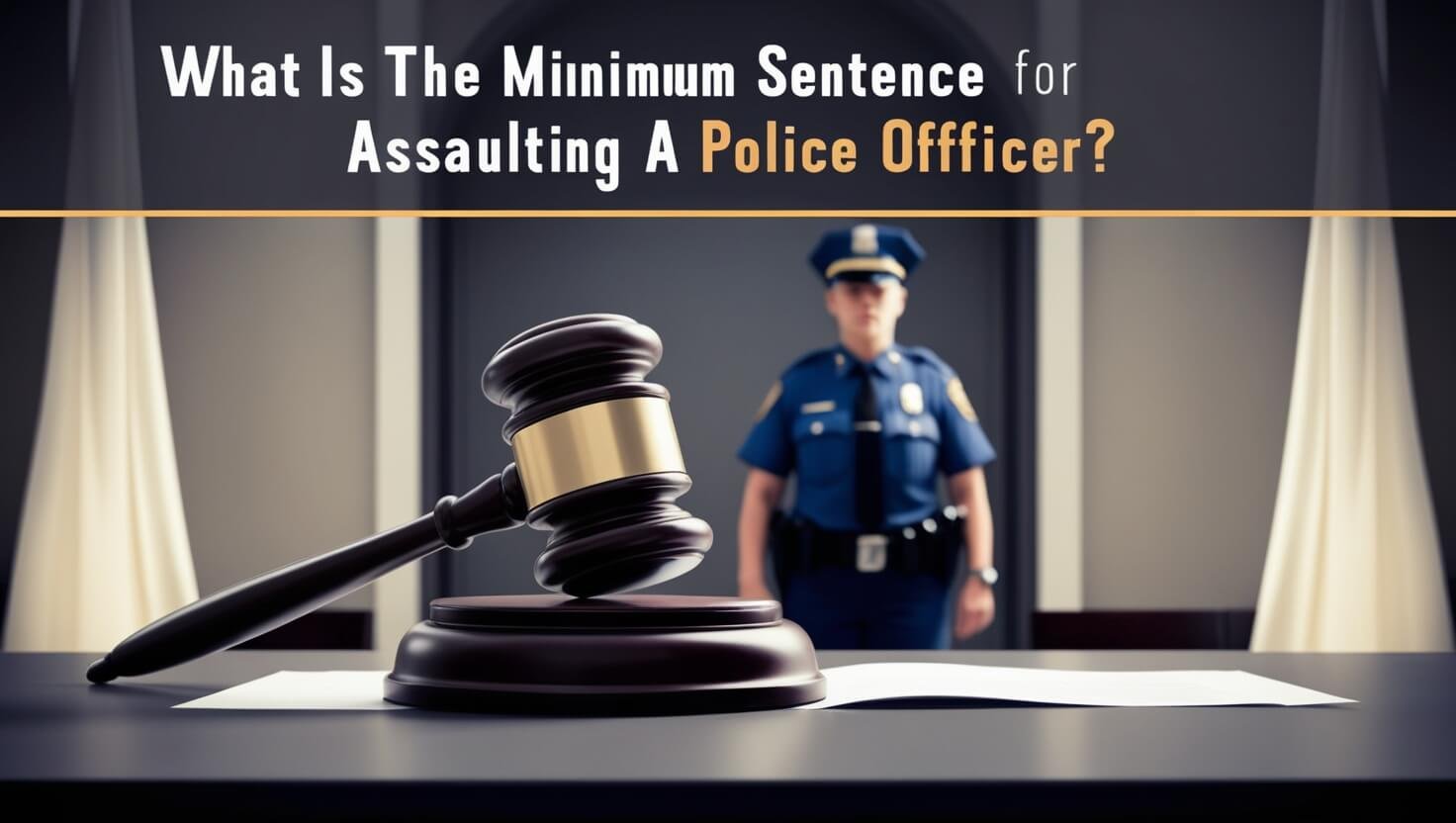What Is the Minimum Sentence for Assaulting a Police Officer?

Assaulting a police officer is a serious crime with severe consequences. The minimum sentence for assaulting a police officer typically ranges from 2 to 5 years in prison, depending on the jurisdiction and severity of the assault. However, the exact punishment can vary widely based on several factors, including the nature of the assault, the officer’s injuries, and the defendant’s criminal history.
In this comprehensive guide, we’ll explore the complexities surrounding assaults on law enforcement officers, the legal ramifications, and the factors that influence sentencing. We’ll also discuss recent trends, prevention strategies, and the long-term consequences of such actions.
Assault on a Police Officer
Definition of assault on a police officer
Assault on a police officer occurs when someone intentionally causes or attempts to cause physical harm to a law enforcement officer who’s performing their official duties. This crime is treated more severely than a regular assault due to the vital role police officers play in maintaining public safety.
Types of assault charges against law enforcement
There are several categories of assault charges when it comes to law enforcement officers:
- Simple assault
- Aggravated assault
- Battery
- Resisting arrest with violence
Each of these charges carries different penalties, with aggravated assault generally resulting in the harshest sentences.
Minimum Sentences for Assaulting a Police Officer
Factors influencing minimum sentences
Several factors can affect the minimum sentence for assaulting a police officer:
- Severity of the assault
- Injuries sustained by the officer
- Use of weapons
- Defendant’s criminal history
- Jurisdiction where the offense occurred
State-by-state variations in minimum sentences
Minimum sentences for assaulting a police officer can vary significantly from state to state. For example:
- In New York, the minimum sentence for second-degree assault on a police officer is 2 years.
- California imposes a minimum of 3 years for assault with a deadly weapon on a peace officer.
- Florida mandates a minimum 5-year sentence for aggravated assault on a law enforcement officer.
These are the lowest sentences. Real punishments can be longer based on the details of each case.
Federal laws on assaulting federal officers
Assaulting a federal law enforcement officer is a separate offense under U.S. federal law. The minimum sentence for this crime is 8 years if a dangerous weapon is used or if the assault results in bodily injury.
Assault in the Second Degree
Definition and examples
Second-degree assault on a police officer typically involves causing physical injury to an officer while they’re performing their duties. This can include actions like punching, kicking, or using objects to harm the officer.
Example: A suspect pushes an officer during an arrest, causing the officer to fall and suffer a sprained wrist.
Minimum sentences for second-degree assault on an officer
The minimum sentence for second-degree assault on a police officer varies by state but often ranges from 2 to 5 years in prison. Some jurisdictions may allow for probation in less severe cases, while others mandate mandatory minimum prison terms.
Assault on a Police Officer
What constitutes this specific charge
Assault on a police officer is generally defined as intentionally causing or attempting to cause physical harm to a law enforcement officer who’s performing their official duties. This charge often requires proof that the defendant knew the victim was a police officer.
Minimum sentences for assault on a police officer
Minimum sentences for this charge typically start at 3 to 5 years in prison. However, if the assault causes serious bodily injury or involves a deadly weapon, the minimum sentence can increase significantly, sometimes up to 10 years or more.
Aggravated Assault on a Police Officer
Definition and circumstances
Aggravated assault on a police officer involves causing or attempting to cause severe bodily harm to an officer, often with the use of a deadly weapon. This is considered one of the most serious forms of assault on law enforcement.
Minimum sentences for aggravated assault on an officer
Due to the severity of this offense, minimum sentences for aggravated assault on a police officer are usually harsh. Many states impose minimum sentences of 10 years or more, with some reaching up to 20 years for particularly egregious cases.
Factors Affecting Sentencing
Prior criminal record
A defendant’s criminal history plays a significant role in sentencing. Repeat offenders or those with a history of violent crimes often face longer minimum sentences.
Severity of injuries
The extent of injuries sustained by the officer can greatly impact the sentence. Minor injuries might result in lighter sentences, while severe or permanent injuries typically lead to longer prison terms.
Use of weapons
Assaults involving weapons, especially firearms, generally carry harsher minimum sentences. The type of weapon used can also affect the severity of the charge and resulting sentence.
Officer’s duty status at the time of assault
Assaults on officers who are clearly identifiable and performing their duties typically result in more severe penalties. However, if the officer was off-duty or not clearly identifiable, it might affect the charges and sentencing.
Legal Defenses Against Assault on a Police Officer Charges
Self-defense claims
In some cases, defendants may argue that they acted in self-defense, particularly if they believed the officer was using excessive force. However, proving self-defense against a police officer can be challenging.
Lack of intent
Defendants might argue that they didn’t intend to assault the officer. This defense can be applicable in situations where the contact was accidental or the result of a reflexive action.
Mistaken identity
In cases where the defendant claims they didn’t know the victim was a police officer, a mistaken identity defense might be used. This can be relevant in situations involving plainclothes officers or unclear identifications.
Consequences Beyond Minimum Sentences
Fines and restitution
In addition to prison time, those convicted of assaulting a police officer often face substantial fines and may be required to pay restitution to cover the officer’s medical expenses and lost wages.
Probation and parole
After serving the minimum sentence, offenders may be subject to probation or parole, which can include restrictions on movement, mandatory counseling, and regular check-ins with a probation officer.
Long-term impact on employment and rights
A conviction for assaulting a police officer can have far-reaching consequences, including:
- Difficulty finding employment
- Loss of professional licenses
- Restrictions on owning firearms
- Challenges in securing housing
- Potential deportation for non-citizens
Recent Cases and Trends
High-profile cases of assault on police officers
Recent years have seen several high-profile cases of assaults on police officers, often in the context of protests or civil unrest. These cases have sparked debates about police-community relations and appropriate sentencing for such offenses.
Changes in legislation and sentencing guidelines
Some jurisdictions have been reevaluating their approach to sentencing for assaults on police officers. While some areas are increasing penalties, others are exploring alternative approaches, such as restorative justice programs for less severe cases.
Prevention and Police-Community Relations
Initiatives to reduce assaults on officers
Law enforcement agencies are implementing various strategies to reduce assaults on officers, including:
- De-escalation training
- Community policing initiatives
- Body cameras and other technology to increase accountability
Improving communication between law enforcement and communities
Efforts to build trust and improve communication between police and the communities they serve are crucial in reducing confrontations that can lead to assaults. These efforts include:
- Community outreach programs
- Transparency initiatives
- Diversity and inclusion efforts in police recruitment
The Bottom Line
The minimum sentence for assaulting a police officer is a complex issue that varies depending on numerous factors. While most jurisdictions impose significant penalties, ranging from 2 to 5 years for less severe cases to 10 years or more for aggravated assaults, the exact sentence depends on the specific circumstances of each case.
Understanding these laws and their consequences is crucial for maintaining public safety and fostering positive relationships between law enforcement and communities. As society continues to evolve, so too will the approaches to addressing and preventing assaults on police officers.
Remember, respecting law enforcement and resolving conflicts peacefully is always the best course of action. If you find yourself in a situation involving law enforcement, remain calm, follow lawful instructions, and if necessary, address any concerns through proper legal channels.






